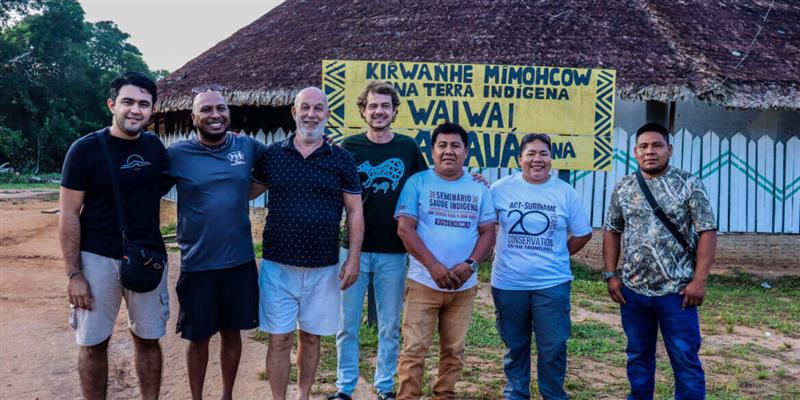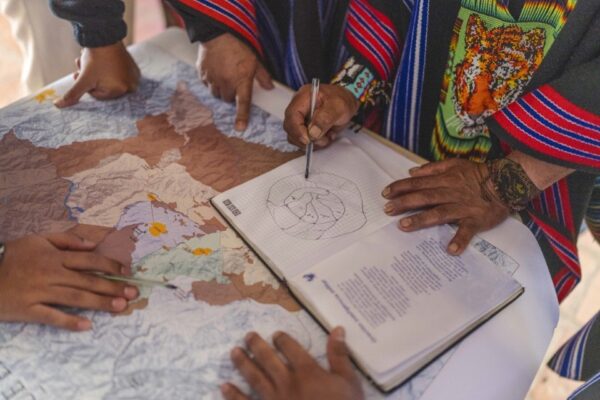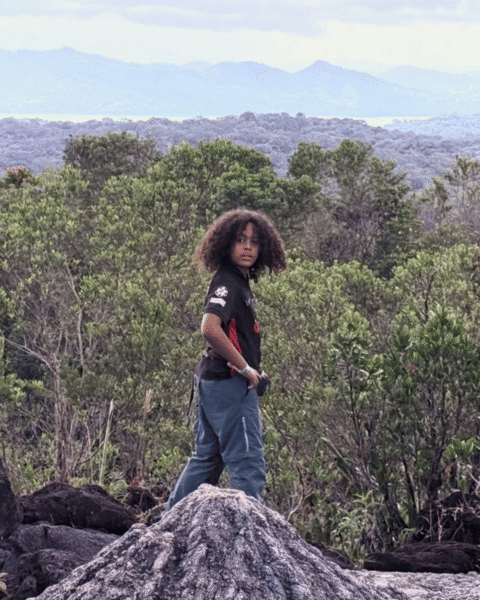Text by Méle Dornelas · Available in Portuguese.

The Wai Wai are an Indigenous people who live across portions of the Guianas (Guyana and Suriname) and northern Brazil, especially in the south of Brazil’s Roraima state. Informal records link their name, which derives from the Karib language family, to the armadillo. The armadillo may be perceived as emblematic of the Wai Wai identity in terms of their deep sense of belonging to the land, their tradition of collective housebuilding, and their ability to carve out pathways through the forest that connect them with different forms of knowledge. These qualities unite them as a people of collective resistance in the defense of their territory.
The Wai Wai way of life is rooted in hunting, fishing, and small-scale agriculture. Despite outside influences, they maintain rituals that honor their relationships with animals and their vital forces—such as featherwork—alongside songs and dances for spiritual evocation and for nurturing relations with other peoples, including non-Indigenous ones. These rituals are known as pawana, which celebrate fertility and community life, while also serving to welcome visitors and strengthen social bonds and alliances.
Although they maintain harmonious relationships with the environment, neighboring peoples, and non-Indigenous communities, the Wai Wai face constant threats to their way of life. Deforestation and invasions by loggers, land-grabbers, and miners threaten their territory. Large-scale projects such as the Jatapu hydroelectric plant also endanger river systems, hindering both navigation and fishing on the Jatapu River—a vital source of sustenance for the community.
A Gathering for Resistance
As part of their strategies to protect their territory and ways of life, the Wai Wai Indigenous Association (AIWA), with support from the Amazon Conservation Team–Brazil (ACT-Brasil), held an exchange from September 8–11 between the Wai Wai of Roraima, Brazil, and those living in Kanashen (the Kanashen Amerindian Protected Area), in Guyana.
The gathering, hosted in the Anauá village within the Wai Wai Territory of Roraima, focused on territorial monitoring and vigilance. Leaders reflected on local practices of land stewardship and daily life, highlighting both the challenges and opportunities of community-based management. With more than 100 participants, the program also featured presentations of territorial monitoring experiences from other Indigenous contexts, bringing inspiration and valuable references to enrich the dialogue.
“This first meeting between the Wai Wai from Guyana and from Roraima was very important. We had dialogues that strengthened unity in defense of the territory, the forests, rivers, animals, and everything that is part of our lives. The gathering came at a time when the Wai Wai here needed this support and this exchange with our relatives in Guyana, Suriname, and Brazil. It is a collective desire. We are only grateful.”
-Alexandre Wai Wai, regional coordinator of Tuxauas (chiefs)
Through this dialogue, the Wai Wai of Roraima and Guyana advanced in building joint strategies for territorial protection, strengthening coordination among their communities. The process was participatory, resulting in the development of a planning framework that includes essential resources for local use, reinforcing both autonomy and the capacity to defend their territories.
The gathering also allowed non-Indigenous partner organizations to gain a deeper understanding of the Wai Wai’s reality, in order to better shape potential assistance activities aligned with the communities’ collective priorities.
“This Wai Wai exchange is very important for us at ACT-Brasil. In strengthening the Wai Wai, we are also strengthening the protection of neighboring peoples, including those living in isolation. When the Wai Wai defend their territories, they contribute at the same time to the protection of these other peoples.”
-ACT-Brasil field analyst Lirian Ribeiro
Continuity through Collective Action
Through this exchange and the co-creation of territorial protection and monitoring plans, the Wai Wai now have another instrument to strengthen their history of social organization and the defense of their lands. The Wai Wai resist collectively, and it is through their gatherings that they fortify both their identities and their very existence.
Don’t miss these powerful stories and updates. Sign up for our newsletter today!
Share this post
Bring awareness to our projects and mission by sharing this post with your friends.




